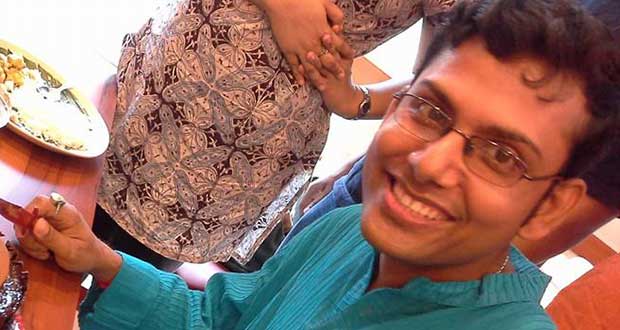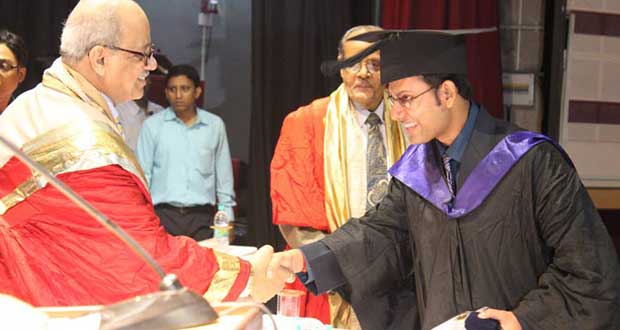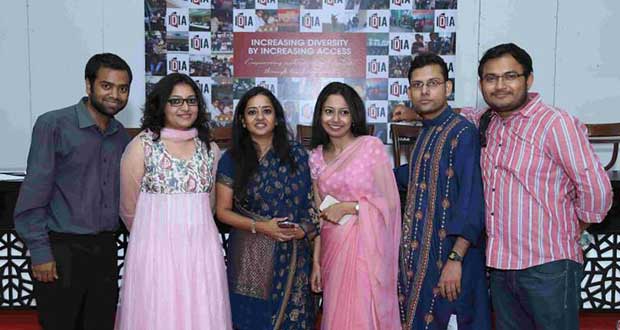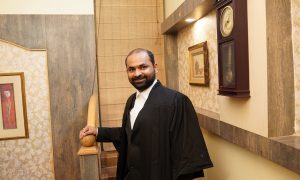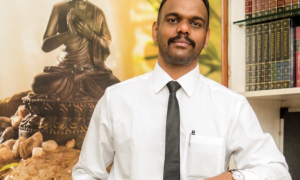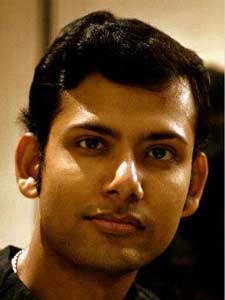 Shouvik Kumar Guha pursued his B.A.LL.B. and LL.M. from West Bengal National University of Juridical Sciences, Kolkata. He has been associated with IDIA since the days of its inception. He has numerous publications in prestigious journals to his name and has authored few books also. He had always planned to pursue a career in academics since his days in law school. Presently, he is working as an Assistant Professor at WBNUJS.
Shouvik Kumar Guha pursued his B.A.LL.B. and LL.M. from West Bengal National University of Juridical Sciences, Kolkata. He has been associated with IDIA since the days of its inception. He has numerous publications in prestigious journals to his name and has authored few books also. He had always planned to pursue a career in academics since his days in law school. Presently, he is working as an Assistant Professor at WBNUJS.
In this interview, he talks about:
Getting high grades and winning gold medals
Co-founding Lexbiosis, Legal Industry Academia Collaboration
Opting for teaching
How would you like to introduce yourself? Tell us a bit about your childhood and pre-college life as well as educational background.
This is a slightly difficult question to answer. Different people in my life know me in different capacities and there is only a handful, who can claim to know me well enough to vouch for what I am saying here. I have no illusion about myself and I guess what I am above all else, is someone who tries to do as much as he can whenever he can of whatever feels the right thing to do –that’s it.
I have been fortunate enough to have had as wonderful a childhood as one can hope for. I hail from a rather humble family myself and my family has throughout my life done everything it can to support me in all my pursuits. I am immensely grateful to my teachers too for having played a pivotal role in me turning into the person that I am today. I was never all-devoted towards academics, although the passion for reading had been inculcated within me very early in my life.
Mathematics and languages were what I used to spend all my studying time on. My primary education, which in my opinion is in many ways the most important one in a person’s life, had taken place in a school of vernacular medium, but of great repute. I later shifted to an English medium school, though I still probably identify myself as a product of the former rather than the latter. I was engaged in scores of extra-curricular activities, ranging from sports (cricket, swimming, athletics, martial arts and so on) to debates and quizzes and I enjoyed every bit of it. I had been inflicted with wanderlust at a very early age and have got many opportunities right from the beginning in my life to indulge in that love, all across the country and beyond, on one pretext or another.
How did your interest gravitate towards law?
Well, I had often been told that my love for reading and writing and penchant for reasoned arguments might make life easier for me if I opted for this line of work. However, it was more of chance that had brought me down this path. I was studying Economics in the Presidency College, when I happened to give the entrance examination for NUJS as a sort of dare with absolutely no prior preparation. I did not do very badly by playing to my strengths during those two hours and after a lot of debates and discussion, I thought it might be interesting to give law a chance. Once I started studying it earnestly, law was quick to seize my fascination. However, my love for Economics and Mathematics did continue to reflect in my inclination towards financial laws and related disciplines.
You have done your graduation and post-graduation from WBNUJS. How would you describe your experience as? How does it feel to be an Assistant Professor in the same college from where you graduated?
I loved my college life with all my being. Still do, as a matter of fact, despite all that have changed since the day I had arrived at this place. It was sort of a Golden Age for NUJS when I had joined back in 2005 as a student rather green behind his ears. From my very first day, I was fortunate enough to be guided and inspired by a superb group of seniors, batchmates and some exceptional teachers. NUJS was undergoing a transformation from my second year onwards, with Prof. M.P. Singh having taken charge as the vice-chancellor. I was therefore lucky to have been taught by many of the experienced teachers from the Menon and Chimni Eras, as well as the younger batch of dynamic faculty members, who had joined during Prof. Singh’s tenure. We lacked a lot of things in terms of infrastructure during the initial years. To access legal databases now deemed commonplace across all NLUs, we had to go across the city to the British Council and American Centre libraries.
However, there was one thing that had been driven into our minds from the very first semester –our journey had just begun and we had not achieved anything great simply by gaining entry in NUJS. On the contrary, it is what we would do in course of the five years that we spend here, that will define us as law students and subsequently, lawyers fit to join the profession. If there was something almost every NUJS student used to share back then, it was an acute hunger –hunger to be the best at what he or she would do. I take almost inordinate pride in having been a part of this institution from back those days. The sheer level of confidence that an NUJS graduate would have in his or abilities to tackle any possible predicament will always beggar belief –and that is an integral aspect of being a successful legal professional, no matter of which hue.
My own batch was a maverick one, but insanely cool, yes! We had all sorts, from the studious note-taker, to the happy-go-lucky truant, from the great mooter to the superb debater to the best of sportspersons. Well, if I start reminiscing about them, this interview would be continuing even when the next batch graduates! I have seen a lot of things change since then. We have had our share of ups and downs. The important thing is not to stagnate, but keep going on, preserving the best from the past and tempering it with the curiosity, needs and efforts of the present, so as to forge it into a legacy that would live up to the scrutiny of the future. Through the years, I have come to love this institution and its members as my extended family and I have found that there is no price too high to pay to ensure its continued excellence. That is why I chose to come back from a corporate job to this place.
While I have always enjoyed challenging research or finding solutions to problems, I only came be love teaching after joining NUJS. Even before my graduation, I had often taught junior batches and when I discovered from the student feedback that I was not doing a total hash of the job and that I am enjoying it a lot too, it was not a matter of if I will come back, but merely when. There is one thing that will always set NUJS apart – its students. If I may be pardoned for mixing metaphors, they have always been the catalyst to shape this institution into what it had been and I consider myself fortunate for being in a position to teach and learn from them in the foreseeable future. Every bit of success that a student achieves, I feel proud for as if it’s been my own, every occasional setback that they face becomes my personal uphill climb. That is what NUJS does –it makes you a part of it and does not let go.
What do you like best about teaching at NUJS? Which subject(s) do you teach? Which one interests you the most? Why?
Students, students and students. The life of a teacher, who is keen to do what is best for the students and also advance the university to progressively increasing heights of glory, is not entirely smooth sailing inside NUJS. However, I just forget all the other problems when I am dealing with the students, whether inside or outside the classroom. I think having been on the other side of the podium not too long ago helps me to figure out the problems faced by the students a lot quicker and come up with solutions acceptable to them. Each student has tremendous potential in one form or another. It is part of the teacher’s duty to ensure that he/she lives up to it. No one is happier than me when a student of mine informs me of success achieved by him/her, no one is more concerned when a student confesses about a problem he/she is having. My students are my family and my responsibility, plain and simple, and in several ways, they have taught me more than vice-versa.
So far, I have tried to offer papers pertaining mostly to financial laws, subjects which are likely to be useful to an NLU graduate intending to etch his/her name in the corporate world. That does not mean I believe that is the only career option available to the students. Just that the number of competent teachers offering similar papers is really less in the legal education sector. Just like most of my batchmates, I too have done my share of griping about such lack and now that I am in a position to do something about it, not doing so would make my earlier actions seem a tad hypocritical.
I have offered papers like The Law & Practice of Project Finance, International Investment Law, The Principles of Insurance Law, Banking Law & N.I. Act, International Banking Law etc. I would really love the opportunity to offer papers related to Corporate Law and Competition Law sometime, both of which are the subjects closest to my heart. Of the papers I have offered so far, Project Finance would be my foremost choice, since I framed this course out of scratch and offered it in an NLU probably for the first time, seeking to incorporate valuable inputs from industry practitioners about what exactly they would like an NLU intern/graduate to be conversant about when he/she joins their team. So far, the students who have opted for this course have provided considerably favourable feedback – many of them have told me how they have fared well during their internships and been praised because of aspects discussed in these classes. These are really moments that make each and every frustration that one may face in this profession seem worthwhile. Depending upon the capacity of students to absorb, I would like to increasingly convert my courses to suit industry standards, involving drafting, negotiations, case studies, transactional work etc. – essentially the way high finance usually works in the real world instead of mere theoretical know-how.
Before joining as an Assistant Prof., you worked as a Research Associate and Guest Lecturer at WBNUJS. How was the experience?
I have always loved taking up challenges in terms of research and my stint at NUJS has provided a lot of such prospects. From contracts to corporate mergers, from media and entertainment law issues to intellectual property matters, the sheer diversity of research that I have been entrusted with so far vindicates my decision to join academia over and over again. I am and shall always be grateful to Prof. M.P. Singh for giving me this opportunity early on, even though formal rules and practices often require a prior LL.M. degree to join as a Research Associate or Assistant. Prof. Singh, however, has always believed in not letting formalities come in the way of progress and he had allowed me the former position even before I could start with my Masters Programme. The little bit of administrative know-how that I have gained in course of this, including conducting the Common Law Admission Test, 2011 and supervising diploma courses offered at NUJS, has also considerably enriched my experiences.
When it comes to teaching, I have been doing that since a few years now, first as a Teaching Assistant and then as a Guest Lecturer and finally, as an Assistant Professor. Honestly speaking, the different capacities do not mean anything different for me, apart from perhaps the fact that I can requisition stationaries with impunity now! All I know is that when I take up the responsibility of teaching a subject to my students, I owe it to each and every one of them to give my hundred percent on a 24/7 basis. If there is a shred of doubt left in any of their minds about any aspect of the course after it has been over, then that is my failure as a teacher. The duties of a teacher cannot remain confined within the classroom walls, they will rightly spill over into the students’ lives outside the classes too. I have been taught by some brilliant teachers and I am lucky to have their footsteps to follow in. Discipline without the imposition of irrational rigour, creating an environment wherein different questions and perspectives and free exchange of ideas are positively encouraged, exhorting the students to bring out their best in what they do –these are all that a teacher ought to strive for. Simply put, my students are my life and I would give up everything else over and over again to teach them and learn from them in turn both inside and outside classroom. I strive to be a teacher who makes himself progressively unnecessary and hopefully, one who gives the student something to take home to think about besides homework!
How did you decide to go into academics? What would be your advice to those law students who wish to go into academia but are instead forced to opt for other fields that are considered more lucrative?
I never thought I would ever opt for an academic life before I came to NUJS. Once I found out academic and policy-based research, as well as teaching at this level is something I am enjoying and not entirely bad at either, coming back was a foregone conclusion –it was a simply a matter of when. Of course, I chose my alma mater because I am, as I have been rightly accused of from time to time, an “NUJS man through and through!”
I can completely understand the plight of someone who wants to opt for an academic life, but has been compelled by circumstances, mostly financial, to opt for other fields instead. I myself had been in similar shoes not that long ago. To them I would say, if you are good enough in what you do and have confidence in your abilities, you can earn the living you need pretty easily, irrespective of which career you end up choosing. I myself was burdened with an educational loan, although the burden was fortunately eased to a certain extent by virtue of scholarships. However, I managed to settle that debt quicker than many who were engaged in corporate jobs. Circumstances may prevent you from taking that leap of faith in the very beginning, but if you really would like to be a part of this world, you can perhaps take a small detour, all the while keeping your sight firmly on this place. I will not pretend that it is not a difficult life at times, but I have also found it far more rewarding than any other option I might have chosen in its stead. If you love what you are doing for a living, whether it be the road oft-taken or its more deserted counterpart, it really does make all the difference.
As a law student, you consistently excelled in academics and bagged a Gold Medal in your LL.M. course from WBNUJS. What are the 3 most important tips that you would like to share with law students for consistently excelling in academics?
Yes, I was sort of dreading this embarrassing moment. I have scrupulously tried avoiding medals of any sort throughout my LL.B. days. Unfortunately, maintaining the resolve turned out to be too much of an effort during my post-graduation phase! See, I have never been the sort of student who would like to prepare for examinations. I never liked them and considered them to be at best unavoidable inconveniences. Even now I do not see many reasons to revise my perspective. I believe there are several more interesting alternatives for gauging a student’s prowess in a discipline. Excellence in academics to me simply means never giving up any opportunity to learn more about the subject that I am studying. If you like reading about a particular subject, then it is your personal decision whether you want to be the best in it. However, as a teacher, I accept nothing less from my students than their complete devotion towards being good in that subject and keep on improving further with the passage of every single day. You do not have to give up everything else in your life; on the contrary, you cannot get so lost among the trees as to be unable to recognize the forest for what it is. Keep calm, prioritize your objectives, manage your time well and never let your sense of propriety or any other sense for that matter, swallow your curiosity –that in essence will mean you can achieve pretty much whatever you want.
Regarding achievement of success, be it professional or personal, I can give this example. NUJS offers law of torts as a subject in the very first semester of the B.A. LL.B. programme. After the end-semester examinations are over, students are usually anxious about their results, grades etc. This is what I say to them –their official academic training in torts is over. The question is whether they are feeling confident enough to represent a client tomorrow in a tortuous matter and provide him the best legal advice possible, or to teach the next batch law of torts in the semester after next. If the answer is yes, then their grade in law of torts doesn’t really matter. If the answer is no, then also, sadly, their grade in law of torts doesn’t really matter. In other words, if you are good in what you do, then irrespective of everything else, success will always hunt you down; you cannot possibly escape from it!
You have co-founded Lexbiosis, Legal Industry Academia Collaboration. How did you go about achieving this? What is the overall model of Lexbiosis?
Actually, Lexbiosis is originally the brainchild of Dr. Shamnad Basheer, who is one of the country’s top experts on Intellectual Property Law and had also been the Ministry of HRD IP Chair Professor at NUJS for several years. I have had the fortune of working with him even before I had graduated and also of having him as one of my mentors. He has always encouraged young law students to engage in meaningful research, reiterating time and again that it is never too early to start.
We have also found that law firms or companies or practicing advocates or other professionals are always on the lookout for quality legal research and committed, intelligent researchers capable of thinking laterally. Using bright NLU students for this purpose not only helps these students gain invaluable experience and exposure to the real world scenario, but it also helps them to learn several soft skills and professional discipline. These researchers are also graded according to their performance and subsequently, when these firms or companies initiate their recruitment drives, these grades and certificates are made available to them. This provides the recruiter a very good yardstick of judging the capabilities of a potential future employee. The fact that it is also cost-effective to the law firms to get such research done by these students doesn’t harm either! Lexbiosis is, however, a fledging organization, and we hope this model will witness an exponential organic growth in the days to come.
You have authored various papers in many reputed Law journals. What role do publications play in the life of an academician? What, in your view, are the few most important skills that law students should strive to acquire in order to write research papers effectively?
Now this is an interesting question. I know of many an academician who treats publications as stepping stones towards glory or merely to score academic points to further their careers. I also know of several who cannot care any less for such factors and simply write about a topic because they feel strongly about it and wish to make their point heard/read. Personally, I feel fortunate to be inclined towards the latter category.
I do not really think there are any ten commandments for writing a good paper. However, I will try to mention a few things that I have found helpful for myself. First of all, your motive should preferably be not merely to publish in order for enhancing your CV, but because you have a genuine interest in the topic concerned and you would like to express your views on the same. There’s no harm in building CV, but what I am saying is that it should not be the primary objective for writing a paper. Several students have asked me they want to start legal writing and whether I can suggest them a topic to write. I do not really believe that’s how it works! You come across a topic, read about it, get interested, read about it some more, start forming an opinion about it, test your opinion against the existing ones, find pros and cons for both sides and then form your argument and defences against counter-arguments –for me at least, that’s how it has always worked, which is why I ended up writing on a few rather esoteric topics, simply because I was reading something in relation to them and they piqued my interest.
You also need to read. I mean, a lot! That’s one of the key features to being a good lawyer. And I don’t mean merely law books –read anything and everything that you can lay your hands on! One of the reasons I have chosen academia is because I can still continue pandering to my rather voracious bibliophilic self. Familiarizing yourself with the usual legal research databases helps a lot. Even the ability to do an efficient and expedited internet search is something that can prove to be astonishingly helpful. There are free-to-use websites like SSRN and Academia.edu that contain a treasure-trove of useful research materials. Another important thing is perhaps to remind yourself repeatedly of the needs, as well as the wants of the audience you’re addressing. Different people respond to different forms of writing. The sooner you can figure that out for yourself, the better are your writing skills going to be. The NLU students can get an early edge in terms of academic legal writing because of the projects and assignments that they have to mandatorily write. I remember how several of my early projects had been converted into subsequent papers, once the teachers concerned assured me that reading them had not been a complete waste of their time! Merely reiterating what others have said earlier and embellishing it with ten footnotes per page may seem adequate to get your paper published in some journal, but that sort of thing has never appealed to me. Academic web-blogs are here to stay now and some of their contents, albeit differently posited and presented than, say, a journal article, are not inferior by any means whatsoever. Academic plagiarism is another important issue for consideration, but that is something for another day.
You have been associated with IDIA from the days of its inception. Please tell us a bit about IDIA and your journey with IDIA.
The IDIA project is something that is very close to my heart. What can a teacher want more than to ensure that every single deserving person gets the opportunity for a higher education by overcoming all obstacles in his or her path? We, who are part of the IDIA family, do not engage in charity. To say so would be an affront to our scholars. They do not want charity, they simply want to be recognized for what they are and what they can do. When I see an IDIA scholar hailing from the remotest village in the country earning accolades in NLUs and competing with their more privileged fellow batchmates without giving any quarter, the pleasure I derive from that is simply indescribable. I myself have come from a lower-middle-income family and I can identify with most of the problems that our scholars face. That is what makes it seem all the more amazing when they continue displaying courage, tenacity and perseverance in their academic and extra-curricular activities.
In the short spell of a few years, IDIA has come far and it is also getting increasing support from established legal professionals pledged to its mission. The way student volunteers from NLUs have responded to this movement is without parallel! I do not know of a single other instance wherein students from any professional and hectic course have fought for a worthy cause en mass! Right now, we have more than forty scholars studying across different law schools and almost twenty state chapters and national verticals, all raring to play their own roles in this movement to facilitate inclusiveness and diversity in legal education in India. Several innovative projects are also in the pipeline and we would love every single law student, academic or other professionals to be a part of the IDIA family. For further details on our achievements and activities and how to be a part of IDIA, please refer to our official website (www.idialaw.com).
What are the main essential qualities of an Academician? What do you think differentiates between lawyers who chose academics from those of other professions?
Integrity, both towards himself/herself and towards his/her subject, discipline, commitment and an insatiable sense of curiosity. Well, strictly speaking, these are the hallmarks of any successful being and I do not see why an academician would be considered as an exception either. For far too long, legal academics have been treated as left-overs of the profession. When I had shifted to academics myself, a lot of people including even those who were part of this world, were quite surprised at my decision –for in their opinion, this role was for someone without any ambition or other recourse. I strongly disagree. If anything, this role brings along with it a sense of responsibility that many other forms of practice of law may be lacking in.
Having said that, I truly believe there is little to choose between two people who have devoted themselves towards efficiency and excellence, one a legal academic and the other a legal practitioner, both very much in love with their respective work. Just like there is little to differentiate between two people, who are pursuing the same two careers, but with reluctance and little or no initiative to better themselves, instead allowing their responsibilities to falter and their abilities to stagnate. While sky is the limit for the former, the latter would do themselves and many other people a whole lot of good by bidding their respective professions adieu.
What would be your advice for law students who want to take up the profession of teaching?
Not much different from what I would advise their fellow students who intend to pursue other professions –be good in what you like. A teacher has to earn the respect of his/her students just like any other professional has to earn the approval of his/her superiors and colleagues. Students are as intelligent as the teacher and often more so, the latter just has had more time in honing his/her skills and managed to pick up a little bit more experience along the road.
This does not mean one needs to be all-knowing; simply do your homework with an effort many times than that of the student in doing his own. One must not lose touch with his/her inner student and cross over entirely to the ‘Dark Side’, so to speak! At the same time, one must take care not to get lost within the groves of academe and become agoraphobic with respect to the external world and the industry practices. I try my best to stay in touch with the latest developments in my subject and how it influences the legal dynamic from both theoretical as well as practical perspectives.
Otherwise, what I say to my students would become with the passage of time a mere fossilized redundancy and would be of no use whatsoever to them. However, all that comes later. As a student, all that you must do is observe, learn, evaluate and file for future use and last but not the least, enjoy these priceless moments that are not going to recur in your life! I consider law students to be (at least for the most part) grown-up individuals, fully capable of making their own decisions in life.
The key point is making informed decisions. Trying your hand at activities that require public speaking, be it mooting, or debating or simply making presentations, may turn out to be useful for later. You also need to try your best to understand the much-elusive ‘other party’s perspective’. When you enter a classroom full of students, you would have to cater to their individual needs and not take care of a selected sample only.
As William Ward had said once, “The mediocre teacher tells. The good teacher explains. The superior teacher demonstrates. The great teacher inspires.”
If you ever start losing the love for learning, well then, run like hell away from this vocation and do not look back, for it is surely not for you anymore! Remember that it is always your choice to be which type of teacher you want to be: the kind that fills the student with so much dry boredom that the latter cannot move, or the kind that just gives the student a little and timely prod that is just right for the latter to jump to the skies.

